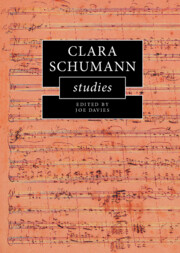Book contents
- Clara Schumann Studies
- Cambridge Composer Studies
- Clara Schumann Studies
- Copyright page
- Dedication
- Contents
- Figures
- Tables
- Music Examples
- Contributors
- Acknowledgements
- Introduction: Clara Schumann in the Musicological Imagination
- 1 Clara and Robert Schumann’s Circles in Dresden
- 2 Disillusionment and Patriotism
- 3 Softened, Smudged, Erased
- 4 A Way with Words
- 5 Clara Schumann and the Nineteenth-Century Piano Concerto
- 6 Clara Schumann and Bach
- 7 Formal Innovation and Virtuosity in Clara Schumann’s Piano Trio in G minor, Op. 17
- 8 Contextualizing Clara Schumann’s Romanzen
- 9 The Young Prophetess in Performance
- 10 Clara Schumann’s Compositional and Concertizing Strategies, and Robert Schumann’s Piano Sets
- 11 Clara: Robert’s Posthumous Androgyne
- 12 Clara Schumann, ‘Clara Schumann’ and the American Press
- 13 Clara Schumann’s Legacy As a Teacher
- Select Bibliography
- Index
4 - A Way with Words
Expressive Declamation in Clara Schumann’s Songs
Published online by Cambridge University Press: 25 November 2021
- Clara Schumann Studies
- Cambridge Composer Studies
- Clara Schumann Studies
- Copyright page
- Dedication
- Contents
- Figures
- Tables
- Music Examples
- Contributors
- Acknowledgements
- Introduction: Clara Schumann in the Musicological Imagination
- 1 Clara and Robert Schumann’s Circles in Dresden
- 2 Disillusionment and Patriotism
- 3 Softened, Smudged, Erased
- 4 A Way with Words
- 5 Clara Schumann and the Nineteenth-Century Piano Concerto
- 6 Clara Schumann and Bach
- 7 Formal Innovation and Virtuosity in Clara Schumann’s Piano Trio in G minor, Op. 17
- 8 Contextualizing Clara Schumann’s Romanzen
- 9 The Young Prophetess in Performance
- 10 Clara Schumann’s Compositional and Concertizing Strategies, and Robert Schumann’s Piano Sets
- 11 Clara: Robert’s Posthumous Androgyne
- 12 Clara Schumann, ‘Clara Schumann’ and the American Press
- 13 Clara Schumann’s Legacy As a Teacher
- Select Bibliography
- Index
Summary
Clara Schumann frequently deviates in her songs from the declamation that the rhythm of the poetry would suggest. The deviations are never haphazard; they can be understood in relation to the semantic and emotional content of the poetry. This chapter investigates the wide range of Schumann’s strategies of text-expressive declamation in songs from 1840 to 1853, focusing on the three songs from 1840 – ‘Am Strande’, ‘Ich stand in dunklen Träumen’ and ‘Volkslied’; on the Opp. 12 and 13 songs from 1841–43; and on the Rollett settings, Op. 23, from 1853. Schumann’s declamatory decisions in the songs from 1840 – particularly those affecting the elongation of particular syllables – already demonstrate her sensitive reading, profound understanding and effective musical rendering of poetic texts. In her later songs, she frequently crafts expressive declamatory processes that span entire songs, for example by adjusting the degree of unexpected declamation as the song progresses in accordance with the emotional trajectory of the poems. Her imaginative and expressive ‘way with words’ is one of the most distinctive aspects of her contributions to the lied repertoire.
- Type
- Chapter
- Information
- Clara Schumann Studies , pp. 75 - 94Publisher: Cambridge University PressPrint publication year: 2021

